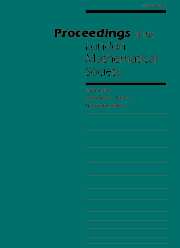Article contents
DE RHAM COHOMOLOGY AND HODGE DECOMPOSITION FOR QUANTUM GROUPS
Published online by Cambridge University Press: 18 October 2001
Abstract
Let $\varGamma =\varGamma _{\tau ,z}$ be one of the $N^2$-dimensional bicovariant first order differential calculi for the quantum groups $\mathrm{GL}_q(N)$, $\mathrm{SL}_q(N)$, $\mathrm{SO}_q(N)$, or $\mathrm{Sp}_q(N)$, where $q$ is a transcendental complex number and $z$ is a regular parameter. It is shown that the de Rham cohomology of Woronowicz' external algebra $\varGamma^\land $ coincides with the de Rham cohomologies of its left-coinvariant, its right-coinvariant and its (two-sided) coinvariant subcomplexes. In the cases $\mathrm{GL}_q(N)$ and $\mathrm{SL}_q(N)$ the cohomology ring is isomorphic to the coinvariant external algebra $\varGamma ^\land _{\scriptscriptstyle{\mathrm{Inv}}}$ and to the vector space of harmonic forms. We prove a Hodge decomposition theorem in these cases. The main technical tool is the spectral decomposition of the quantum Laplace-Beltrami operator. 2000 Mathematical Subject Classification: 46L87, 58A12, 81R50.
Keywords
- Type
- Research Article
- Information
- Proceedings of the London Mathematical Society , Volume 83 , Issue 3 , November 2001 , pp. 743 - 768
- Copyright
- 2001 London Mathematical Society
- 14
- Cited by


